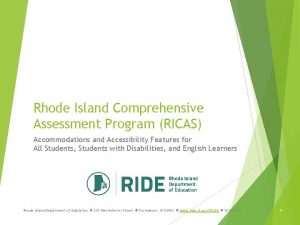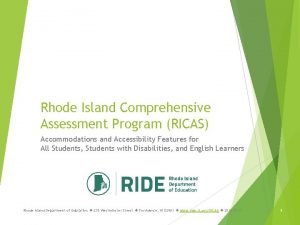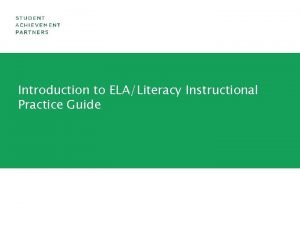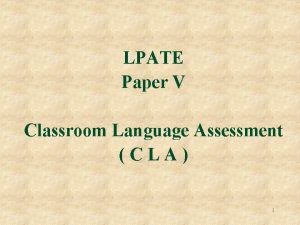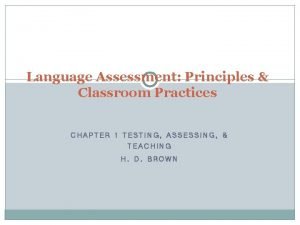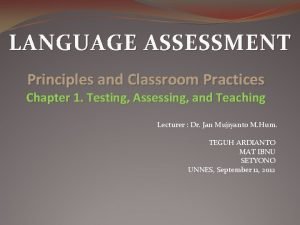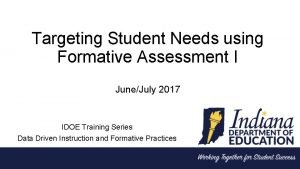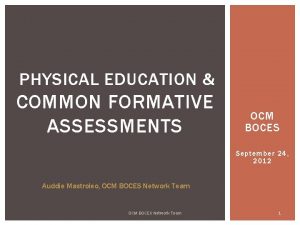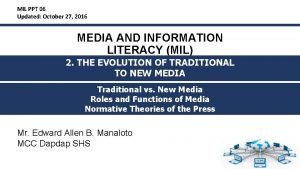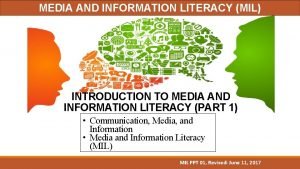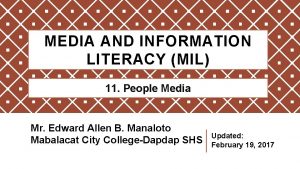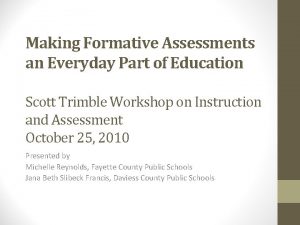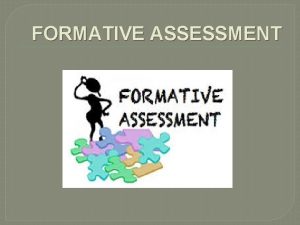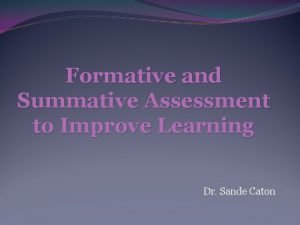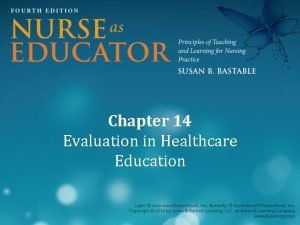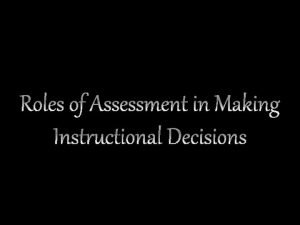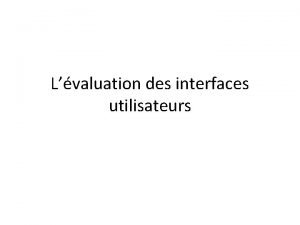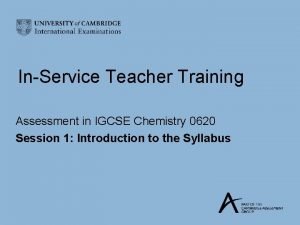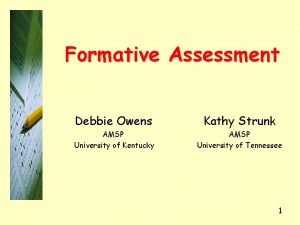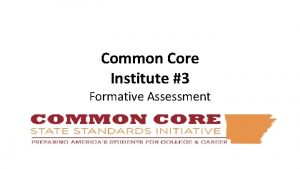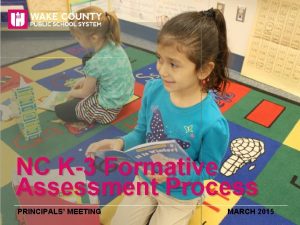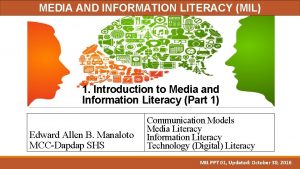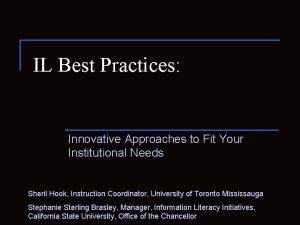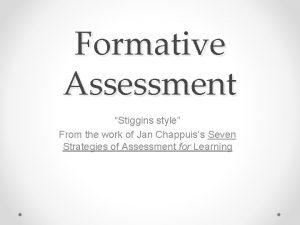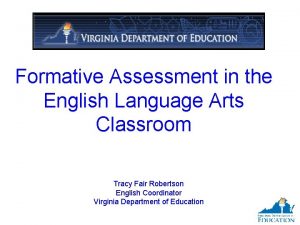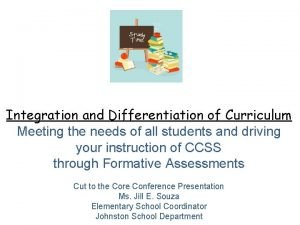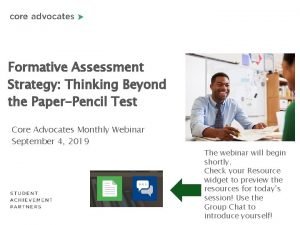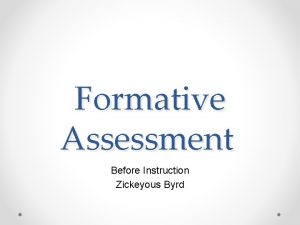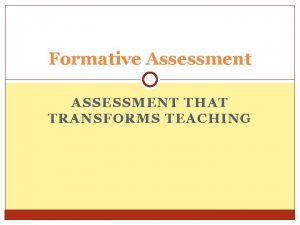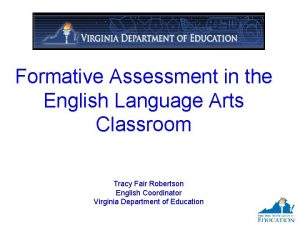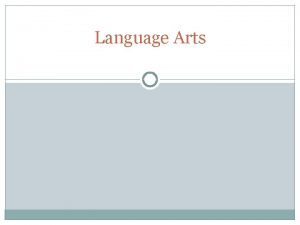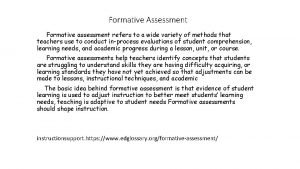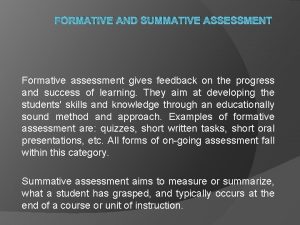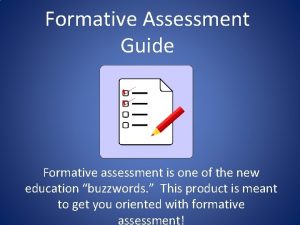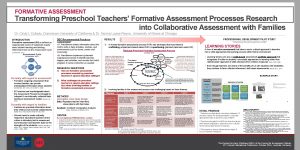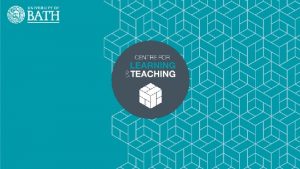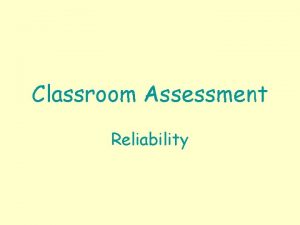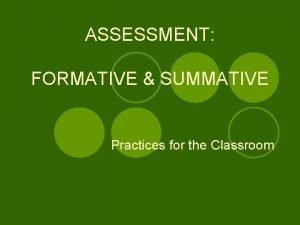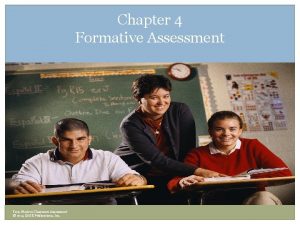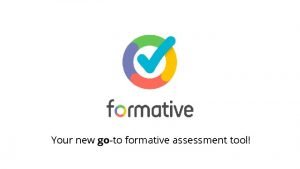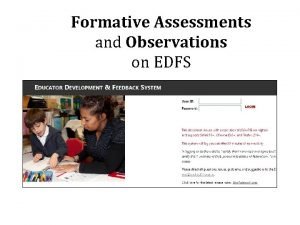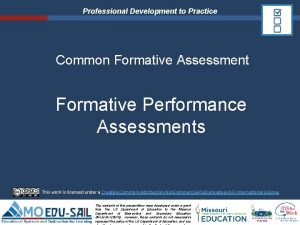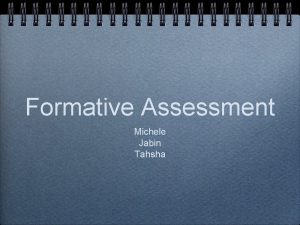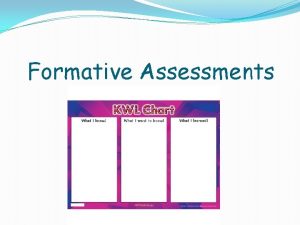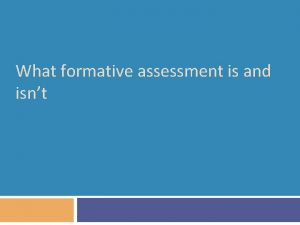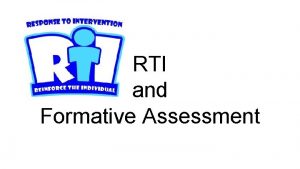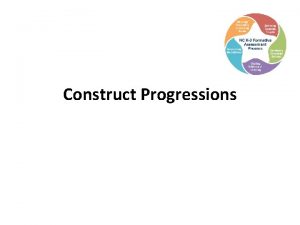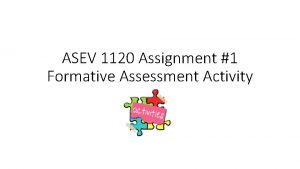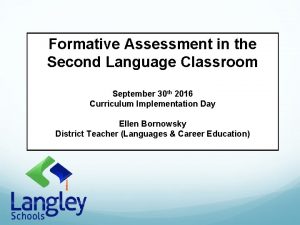Formative Assessment in the English Language Arts Classroom






























- Slides: 30

Formative Assessment in the English Language Arts Classroom Tracy Fair Robertson English Coordinator Virginia Department of Education

“Informative assessment isn’t an end in itself, but the beginning of better instruction. ” Carol Ann Tomlinson

Formative Assessment

Defining Formative Assessment

Defining Formative Assessment • Keys- be flexible, allow for change, expect diversity • Lesson plans not set in stone

Formative Assessment Testing companies in the K– 12 education market, seeking to support the trend toward more testing, sometimes advertise products as "formative assessments. " This adds to the confusion by encouraging the idea that it's the test itself that's formative (Chappuis, 2005).

Formative Assessment But in many districts, formative assessments are really interim benchmark assessments that provide information about progress toward a set of expectations. These only occur a few times per year and are used only minimally for making instructional decisions. In other words, it is akin to taking your temperature but doing nothing even if thermometer indicates you have a fever. A Formative Assessment System for Writing Improvement Nancy Frey & Douglas Fisher English Journal 103. 1 (2013): 66 -71

Formative Assessment The teacher is the most important agent of assessment. Most educational assessment takes place in the classroom, as teachers and students interact with one another. Teachers design, assign, observe, collaborate in, and interpret the work of students in their classrooms. They assign meaning to interactions and evaluate the information that they receive and create in these settings. In short, teachers are the primary agents, not passive consumers, of assessment information. It is their ongoing, formative assessments that primarily influence students’ learning. NCTE Standards for the Assessment of Reading and Writing: Standard 2

The best literacy assessments take the student’s and the assignment’s contexts into account. http: //blogs. ncte. org/index. php/2015/03/a-common-language-for-responding-to-writing/

Formative Assessment vs Summative Assessment Formative • NOT a product • Delivers information DURING instruction • Used to check students’ understanding and plan instruction Summative • Results used to make judgments • Results in grades • Provides information about knowledge attainment • Evaluates student learning at end of instructional unit

Formative Assessment vs Summative Assessment

Formative Assessment

Formative Assessment

Formative Assessment Tools: - Observations

Formative Assessment Tools: - Observations

Formative Assessment Tools: - Conversations

Formative Assessment Tools: - Conversations

Formative Assessment Tools: - Student Self Evaluations

Formative Assessment Tools: - Student Self Evaluations

Formative Assessment Tools: - Artifacts of Learning

Formative Assessment Tools: - Artifacts of Learning

Formative Assessment • • Socratic seminar Text-dependent questions Exit/Admit Slips Learning/Response logs Graphic Organizers Peer/Self Assessments Visual representations Kinesthetic assessments

Formative Assessment Tools

Exit Slips • • • Rate your understanding of today’s topic from 1 -10. Discuss one way today’s lesson can be used in your life Predict what we will learn next in this unit and why. What would you like to review during the next session? Summarize today’s lesson in 25 carefully chosen words The best part of class today was. . .

Observation Folder • Teacher records notes about student learning- keeps a running record of student progress • Use overlapping index cards- one per student

Formative Assessment Tools: - Student Self Evaluations http: //www. exemplars. com/resources/rubrics/student-rubrics

Formative Assessment Tools: - Student Self Evaluations http: //www. exemplars. com/assets/files/seed. pdf

• Questions?

Bibliography Atkin, J. M. , Black, P. , & Coffey, J. (2001). Classroom Assessment and the National Science Standards. Washington, DC: National Academies Press. Chappuis, S. (2005). Is formative assessment losing its meaning? Education Week, 24(44), 38. Committee, NCTE Executive. "Formative Assessment That Truly Informs Instruction: A Position Statement. " (2013): n. pag. NCTE Library. Web. 30 Apr. 2015 Fournel, Jenna. A Common Language for Responding to Writing. Web blog post. Literacy & NCTE. 14 March 2015. Web. 2 June 2015. Standards for the Assessment of Reading and Writing, Revised Edition (2009). National Council of Teachers of English, International Reading Association, 2009. Web. 14 Apr. 2015. Stiggins, R. , Arter, J. , Chappuis, J. , & Chappuis, S. (2006). Classroom assessment for student learning: Doing it right—using it well. Portland, OR: Educational Testing Service. Wees, David. 56 Examples of Formative Assessment. Web blog post. The Reflective Educator. Word Press. 12 December 2013. Web. 8 June 2015.

Contact Information Tracy Fair Robertson English Coordinator Tracy. Robertson@doe. virginia. gov 804 -371 -7585 Assessment Office Student_assessment@doe. virginia. gov 804 -225 -2102 Virginia Department of Education
 Creative arts grade 8 exam papers 2019 term 2
Creative arts grade 8 exam papers 2019 term 2 Ricas accommodations
Ricas accommodations Ricas accommodations and accessibility features manual
Ricas accommodations and accessibility features manual Instructional practice guide
Instructional practice guide Lpate
Lpate Language assessment principles and classroom practices
Language assessment principles and classroom practices Language assessment: principles and classroom practices
Language assessment: principles and classroom practices Formative assessment process
Formative assessment process Common formative assessment examples
Common formative assessment examples Mil ppt
Mil ppt Medium in mil
Medium in mil Media people
Media people Scott trimble workshop
Scott trimble workshop What is formative assessment
What is formative assessment What is a summative assessment
What is a summative assessment Facets of formative assessment
Facets of formative assessment Rsa evaluation model
Rsa evaluation model Formative diagnostic and summative assessment
Formative diagnostic and summative assessment Example of naturalistic observation
Example of naturalistic observation Nature of formative assessment
Nature of formative assessment Round robin charts formative assessment
Round robin charts formative assessment Common core formative assessments
Common core formative assessments Formative assessment
Formative assessment Ritual or expressive model of communication
Ritual or expressive model of communication Formative assessment is tasting the soup while cooking
Formative assessment is tasting the soup while cooking Formative style
Formative style Formative assessment
Formative assessment Examples of formative assessment
Examples of formative assessment Examples of formative assessment
Examples of formative assessment Examples of formative assessment
Examples of formative assessment Summative and formative assessment
Summative and formative assessment

